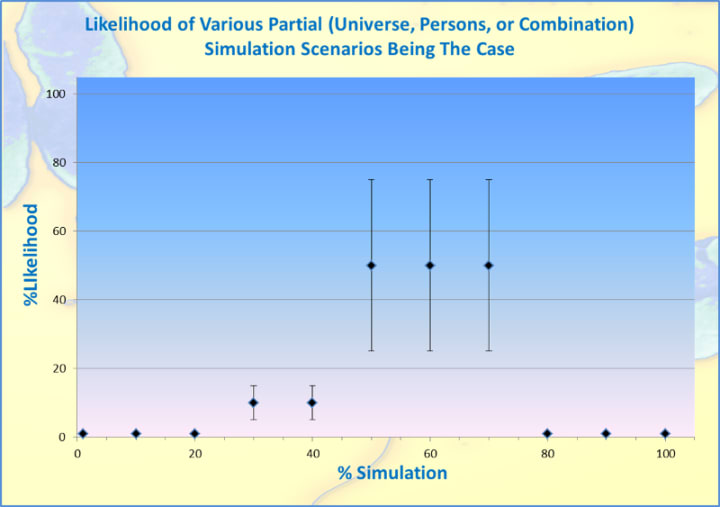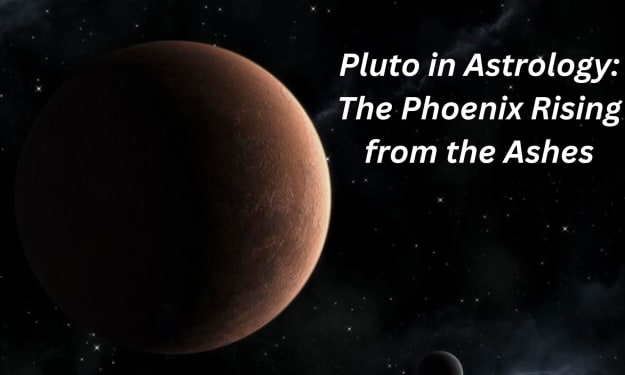Thinking About Constraints On Partially Simulated Universe Scenarios
It Gets Complicated

If we can accept the possibility that the universe and/or ourselves may be partial simulations it is easy to be quickly overwhelmed by the various possibilities that might arise and their implications. Not only do we have a quantitative value (% simulation vs % real with possible values of the smallest amount of simulation that is greater than zero to the largest amount of simulation that is less than 100) we also have three possibilities for what is partially simulated; ourselves, the universe, or some combination of both. if we have any hope of evaluating the possibilities and implications of partial simulations I think it necessary to try and focus our efforts on the most likely scenarios. To that end I have been thinking about how we might whittle them down to at least a smaller number of the most reasonable scenarios. As with all writings on this topic if I and you are simulations and/or are living in a simulation then these words, the fact that I am writing them down here and now, may very well have been programmed into me or the universe from before I was ‘born’. If that is the case I say “fuck off simulators, you all can bite me.” You think that was programmed in? If it was then I will grant that our hypothetical simulators have an excellent sense of humor and very good taste indeed.
Let’s look a little more closely at the quantitative value and ask if we can perhaps at least narrow down the range some. I tend to think that the very high and very low levels of simulation options can be set aside as unlikely for the simple reason of why bother. If you were going to go to all the trouble to simulate 90% of an entire universe and/or a person why would you not just go all the way. Similar story on the low end, how much can you really influence things with only 9% of the universe and/or a person simulated. Better to just leave reality be until you can figure out a way to create a total simulation or at least up the simulated portion to at least 50%. Figure 1 shows shows a made up plot of made up data based on my own hypotheses and wild ass guesses.

Awfully weak arguments I know but I don’t want to dedicate a lot of mental horsepower to the setup because I’m much more interested in the punchline. If one accepts the above constraints than for the most part we can ignore anything <50% to >75% simulated as unlikely (i.e. if we or the universe or some combination is/are partially simulated it/they is/are most likely on the order of 50–75% simulated).
Since we have narrowed the quantitative portion of our available partial simulation scenarios can we do the same for the qualitative piece, what is to be simulated? Recall that we have three options ourselves (which I take to mean all intelligent life on earth not confined to just humans necessarily) the universe, or some combination of the the two. I do not want to complicate the discussion here by microanalyzing the meaning of ‘ourselves’ and the ‘universe’. Suffice to say their are some thorny issues for sure. For instance what do we do about intelligent non-human animals? Are they considered part of ‘the universe’ or ‘ourselves’ as I have defined it? What about intelligent aliens or what if aliens have actually abducted some humans in the past and are holding them in a different part of our galaxy, or a different galaxy all-together, do they still count as part of ‘ourselves’, etc.? That discussion will have to happen at another time, or not happen at all, depending on how bored I am, or how excited I get, or angry, who knows really. Anyway for now I am taking ‘ourselves’ at its average, workaday, meaning, all human beings currently alive anywhere, which in the most likely of possibilities is confined to on, above, or in orbit around the earth.
I am going to jump the gun on this one and reveal my answer before I give any of my reasons. Why? No freakin clue but it seems like a good idea as I sit here typing away. I believe any hypothetical partial simulators would almost certainly partially simulate the universe before they would attempt a partial simulation of ourselves or a combination of the two. I have two reasons for this belief, that I can think of right now, off the cuff, I am sure more will come to me at some point but these two are going to have to suffice for now.
1. The problem of simulating intelligence — (I will grant it is less of a problem for a partial simulation, dependinging on how you partition the simulated portion, but it is still a big problem). Those of you who know my writings know I have a hard on for artificial intelligence debunking. My reasons for that are multifaceted, complex, and of course awesome but mostly I struggle to believe that it is possible to reproduce human intelligence (true intelligence) in any non-human, non-animal, human like being. In other words for a being to be intelligent it must possess both a conscious, rational, logical, “mind’ and at least one and probably more than one sensory modalities that allow the being in question to interface with the universe (real or simulated) in a manner such that the rational part of the being is modified in some way through the sensory inputs imparted via the sensory system(s). Those inputs must then work (in some fashion) in concert with the rational abilities to generate “thoughts”, “ideas” and ultimately “decisions” and “actions”. Not exactly a novel definition of intelligence. Basically you need a mind and a body, and they need to work together. Only one of the two not going to cut it. The tricky part is that interface piece. We have sensors from here to Katmandu that can measure and analyze just about anything. They can convert those measurements into a multitude of forms including data, that data can be taken up by computers and converted into lots of different things, including actions, even behaviors maybe, but the deconvolution of the sensory data into something else is still totally defined by conventional algorithmic data processing methods. No matter how clever, how mathematically or statistically sophisticated, those algorithms are still ultimately solvable equations. If they were not, the computer could not compute. True intelligence is not and never will be a solvable equation. Thus even though our simulators may be the most intelligent beings in the “actual universe” and have solved every equation yet posed they still would lack the ability to create a non solvable system, which they then would also need the courage to risk releasing into the actual universe, a universe of which they are members. Certainly seems a very risky proposition for any being, no matter how powerful. Since we are talking partial simulations here one could imagine that our bodies are mostly simulated. Only our minds and some of our feeling/sensory modalities are actual. This certainly is possible within the constraints I have laid out but I struggle with the purpose question which brings me to reason two.
2. The problem of the purpose of the partial simulation. — I think most would agree that our hypothetical simulators would need a reason to simulate. No matter how smart or powerful they may be it would seem quite an investment of time and resources to assemble the computational infrastructure, figure out and provide the sustaining energy systems, and most likely continuously monitor a system as complex as a partial person or partial universe simulation. Therefore, they must have a reason or reasons for said partial simulation. What would be the reason for partially simulating a person in an actual universe? To be honest I struggle to think of any that could be justified given the hypothetical risk to the universe releasing a partially simulated being into it might pose to any inhabitants of that universe, including the simulators themselves. Why take that risk when you can get the same bang for the embedding real, actual, beings into a partially simulated universe. How this could be done is beyond my imaginings at the moment but at least I can conceive of how much more easily such a scenario could be controlled. Since the the universe is partially simulated any damage caused by the real humans could be theoretically contained to only a portion of it and more than likely the universe/reality could be modified to any extent necessary to head off even the possibility of the humans causing any real damage before it could happen. In the case of a partially simulated human in the real universe, while it might be possible to have a similar level of “control” I think it more difficult because, as I discussed above, the intelligent portion of the person would have to be at least the majority of the total and may be or become clever enough to “slip his simulated shackles” if you will and act in direct contradiction to the will/desires of the simulators. I can only imagine how angry I would be if I found out that part of myself was only a simulation. Discovering that a portion of the universe was simulated would not make me angry in the least, it would definitely ignite my curiosity and wonder but I would not be immediately concerned with finding and punishing those responsible.
So there you have it for now. Way too many words later and we have arrived at our stopping point and conclusion. If indeed the partial simulation hypothesis is correct than I think it more than likely that the simulated portion is 50–75% of the universe in which we exist as 100% actual beings. I will explore the implications of this at some point, probably, more than likely, maybe, or not. For now I am off to Arby’s, they really knocked it out of the park with their new Gyro sandwich, seriously, I actually like it, cut me some slack already. I will also order a small mountain dew as I am quite thirsty.
Author's postscript: First published on Medium, May 2017
About the Creator
Everyday Junglist
Practicing mage of the natural sciences (Ph.D. micro/mol bio), Thought middle manager, Everyday Junglist, Boulderer, Cat lover, No tie shoelace user, Humorist, Argan oil aficionado. Occasional LinkedIn & Facebook user






Comments
There are no comments for this story
Be the first to respond and start the conversation.